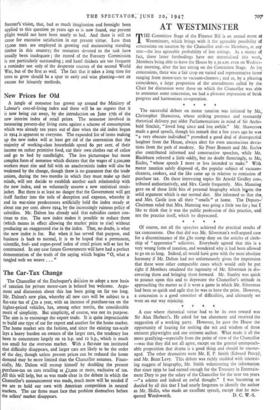AT WESTMINSTER
THE Committee Stage of the Finance Bill is an annual event at Westminster, which brings with it the agreeable possibility a concessions on taxation by the Chancellor and—to Members, at any rate—the less agreeable probability of late sittings. As a matter a fact, these latter forebodings have not materialised this week,' Members being able to leave the House by I.3o am. even on Wednes- day morning, after the last sitting on the Committee Stage. As for concessions, there was a fair crop on varied and representative items' ranging from motor-cars to vacuum-cleaners ; and as, by a pleasing coincidence, a large proportion of the amendments called by the: Chair for discussion were those on which the Chancellor was able to announce some concession, we had a pleasant impression of brisk progress and harmonious co-operation.
* * * *
The successful debate on motor taxation was initiated by Mr.1 Christopher Shawcross, whose striking presence and resonantly rhetorical delivery put older Parliamentarians in mind of Sir Archi. bald Sinclair, "loved long since and lost awhile." Mr. Shawcross, made a good speech, though his remark that a few years ago he was " a very obscure individual " provoked a good deal of disrespectful laughter from the House, always alert for even unconscious devia- tions from the path of modesty. Sir Peter Bennett and Mr. Eccles also contributed informed and constructive speeches, while Mr. Blackburn referred a little oddly, but no doubt flatteringly, to Mr., Eccles, "whose speech I more or less intended to make." With motor taxation safely disposed of, the popular subject of vacuum- cleaners, cookers, and the like came up in relation to remission of purchase tax. On these interesting topics Sir Arnold Gridley con' tributed authoritatively, and Mrs. Castle frequently. Mrs. Manning gave on of those little bits of personal biography which leg,ven the solid argument which is our normal diet. She informed us that she) and Mrs. Castle iron all their " stalls " at home. The Deputy-,/ Chairman ruled that Mrs. Manning was going a little too far ; but I, like to think that it was the public profession of this practice, andI not the practice itself, which he deprecated.
* * * *
Of course, not all the speeches achieved the practical results of tax concessions. One that did was Mr. Silverman's well-argued case for a discontinuance of the £8o stamp duty on the articles of clerk- ship of " apprentice " solicitors. Everybody agreed that this is a very wrong form of taxation, and wondered why it had been allowed to go on so long. Indeed, all would have gone with the most absolute harmony if Mr. Dalton had not unfortunately given the impression that there were other comparable cases which would only be put right if Members emulated the ingenuity of Mr. Silverman in dis- covering them and bringing them forward. Mr. Stanley was quick to pounce upon this and to deprecate the Chancellor's attitude in approaching the matter as if it were a game in. which Mr. Silverman had been so quick and agile that he was to have the prize. However, a concession is a good smoother of difficulties, and ultimately we went on our way rejoicing.
* * * *
A case where rhetorical virtue had to be its own reward was Sir Alan Herbert's. He asked for tax abatement and received the suggestion of a working party. However, he gave the House the opportunity of hearing for nothing the wit and wisdom of three eminent playwrights and one eminent author. What made it all the more gratifying—especially from the point of view of the Chancellor was that they did not all agree, except on the general unimpeach-, able proposition that drama is a good thing and should be encour- aged. The other dramatists were Mr. E. P. Smith (Edward Percy) and Mr. Benn'Levy. This debate was richly studded with interest- ing nuggets of biography, Mr. Smith volunteering the information that since 1939 he had earned enough for the Treasury in Entertain- ment Duty to pay the salary of the Chancellor for the next ten years "a solemn and indeed an awful thought." I was becoming so dazzled by all this that I had nearly forgotten to identify the author as Mr. Hollis, who made an excellent speech, except that he mis-


































 Previous page
Previous page